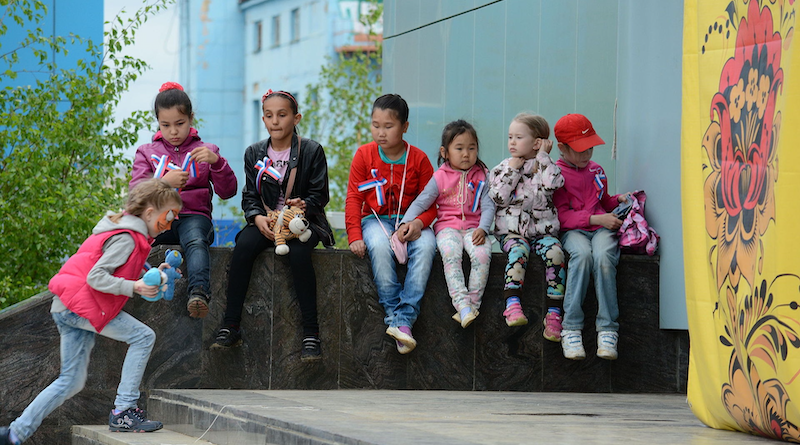Moscow’s War On Indigenous Siberian Cinema May Have Long-Reaching Implications
The Sakha people, also known as the Yakuts, are the largest indigenous ethnic group in Siberia. They inhabit the eponymous Sakha Republic, which is Russia’s largest federal subject in terms of land area and includes some of the coldest settlements on earth. Besides its extreme weather conditions, Sakha is known for its unusually vibrant ethnic activism and modern popular culture.
Many of Russia’s minority languages are severely endangered, but Sakha remains widely spoken even in urban settings. Unlike most other Indigenous Siberians, the Sakha enjoy frequent music and movie releases in their native tongue. Sakha cinema has been described as unique – it is rare to see a thriving regional culture market in modern-day Russia which is extremely Moscow-centric.
In September 2023, Sakha cinema ceased to be solely a cultural phenomenon. It gained a political dimension when Russia’s censorship agency Roskomnadzor asked for the Sakha movie Aita to be removed from streaming media services.
Stepan Burnashev’s Aita takes place in a Sakha village where the only ethnically Russian resident is a police officer named Afanasy. When the movie’s namesake Aita, a teenage Sakha girl, attempts suicide leaving a note with the Russian policeman’s name, he becomes a suspect. Later, it becomes clear that this was a confusion – Aita happened to have an internet boyfriend also named Afanasy who was Sakha and lived in a different village. In the end, Aita’s neighbors who suspected the Russian policeman of causing her to attempt suicide apologize to him.
Nevertheless, Moscow censors claimed Aita portrayed Sakha people as the “good guys” and ethnic Russians as the “bad guys”. This was enough for Roskomnadzor to ban the movie. According to the agency’s spokesperson, “destructive information that contradicted the principles of the unity of the peoples of Russia” was the reason for the ban.
Just three days later, the Russian Ministry of Culture refused to issue a distribution certificate to the producer of another Sakha movie, Candidate by Dmitry Shadrin. Without this certificate, Candidate cannot be legally screened in any movie theater in Russia. The reasoning for this ban was alleged “LGBT propaganda” – this is how government officials described an episode where a male actor was wearing women’s clothes.
On November 1, Sakha cinema was discussed at a meeting of the Russian Presidential Council for Interethnic Relations. Council member Aleksandr Dyukov described Aita as a “nationalist movie” and called the Sakha Republic an “ethnocracy” that has committed a “quiet ethnic cleansing of Russians”. To support his claim, Dyukov cited statistical data: over 550 thousand ethnic Russians lived in Sakha as of 1989, but only 276 thousand remain there now.
Sakha activists called Dyukov’s statement offensive and factually wrong. Most of the ethnic Russians who left the republic in the last 30 years did so for economic reasons or because they wanted to live in a warmer climate. A large part of Sakha’s Russian population were transplants from other regions who came there for work under the Soviet Arctic development policy. Naturally, many went elsewhere when the USSR’s economy collapsed and numerous mines and factories had to be abandoned. To put it simply, there were no signs of indigenous Sakha people urging Slavic Russians to leave – they did so voluntarily.
Commenting on Moscow’s war on Sakha cinema, Tatarstan-based journalist and historian Mark Shishkin described the censors’ actions as “Russian authorities creating problems out of thin air”.
“Do we not understand that angering and alienating the Sakha creative class is a really bad decision? They are a social group with a significant media presence, a well-earned reputation and a great deal of influence on Sakha people’s minds. These pointless attacks may have long-reaching implications we will see in 10 or 20 years from now,” Shishkin wrote.
It is clear that the censors’ arguments about Sakha movies “promoting xenophobia and LGBT identities” were a mere formality. Surprisingly, the real reason for this seemingly unmotivated attack was laid out well before it actually began. Four years ago, the phenomenon of increasingly popular Sakha cinema was noticed by the London-based journalist Oleg Kashin, often described as a Russian ethno-nationalist.
“A regional culture that is independent from the national culture is one of the most important prerequisites for secessionist demands. If I was part of the Russian government, I would try to suppress it. Else, we will see Free Sakha banners all over Europe”, Kashin wrote in 2019.
The Russian invasion of Ukraine has caused a sharp increase in ethnic activism among minority populations. Informal leaders speaking on behalf of Russia’s indigenous peoples rightfully claim their coethnics are unfairly overrepresented among those sent to fight in Ukraine. Combined with the pre-existing dissent against Russia’s overcentralization, unfair budget redistribution and assimilationist policies, this led to a surge in secessionism.
Four years ago, “Free Sakha” was a Russian nationalist bogeyman. Today, it is a real pro-independence movement. We may not know if Moscow censors got their idea from Oleg Kashin, but it is fair to assume that they followed a similar way of thinking. The ongoing attack on Sakha cinema is the Kremlin’s answer to the Sakha people’s growing ethnic consciousness, but Shishkin is likely right about this strategy being inefficient.
In the age of the internet, silencing the Sakha creative class is impossible. Moreover, while trying to do so, Moscow might further radicalize it and thus contribute to the growth of a strongly non-Russian identity and secessionist demands.

